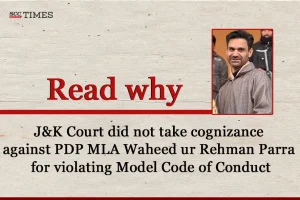Jammu and Kashmir Court: In a case wherein, it was alleged that PDP MLA Waheed ur Rehman Parra (‘accused’) organised a road show in violation of the Code of Conduct during the Assembly elections and an offence under Section 188 of the Penal Code, 1860 (‘IPC’) was established against him, a Single Judge Bench of Muneer Ahmad Bhat, Additional Special Mobile Magistrate, Awantipora, noted that the case was listed for arguments on cognizance and held that since the requirements of Section 195 of the Criminal Procedure Code, 1973 (‘CrPC’) were not met in the present case, no cognizance under Section 188 IPC could be taken.
On 6-5-2024, an application was received at the Awantipora police station which stated that on 27-4-2024, the accused organized a rally without obtaining the necessary permissions during the Assembly elections, thus violating the Model Code of Conduct. The Investigation Officer visited the site of occurrence, prepared a site map, and recorded the statements of the witnesses and thereafter recorded an offence under Section 188 IPC. The accused appeared at the police station on 17-8-2024 and since the offence was bailable, he was released from police custody upon producing a bail and a personal bond. The charge sheet was filed on 14-9-2024 and the case was listed for arguments on cognizance.
The accused’s counsel stated that the cognizance of the alleged offence was barred as there was no written complaint annexed with the challan as mandated by Section 195(1)(a) CrPC. But the argument was refuted by APP, who contended that the cognizance was not prima facie barred as there was sufficient evidence to proceed further into the matter.
The Court referred to Sections 2(d) and 195 CrPC and remarked that the object of these provisions was to protect the people from being needlessly harassed by vexatious prosecutions in retaliation. The Court relied on Supreme Court’s decision in Govind Mehta v. State of Bihar, (1971) 3 SCC 329, and C. Muniappan v. State of T.N., (2010) 9 SCC 567, and observed that the offence under Section 188 IPC could be taken cognizance of only in accordance with Section 190(1)(a)(i) CrPC. The Court opined that since in the present case, the challan was without a written complaint, no cognizance could be taken of the alleged offence.
The Court noted that the accused was charged with violating the Model Code of Conduct which could not be classified as an order under Section 188 IPC. It served solely as guidance for the political parties and candidates and lacked statutory backing. Many of its provisions were not legally enforceable. The Court opined that even if it was considered as an order under Section 188, the document nowhere specified which public servant issued it, which was required, as cognizance under Section 188 IPC could only be taken upon a complaint from the public servant whose order was violated, or from their superior. Since the Model Code of Conduct was issued by the Election Commission of India, thus ideally, any prosecution should have been based on a complaint by the Commission itself.
The Court held that since the mandatory requirements of Section 195 CrPC were not met, no cognizance of an offence under Section 188 IPC could be taken. The challan was dismissed, and the accused was released. The Court further discharged the bail bonds and personal bonds of the accused.
[State (UT of J&K) v. Waheed ur Rehman Parra, CNR No. JKPL080003692024, decided on 4-7-2025]
Advocates who appeared in this case:
For the Complainant: Ruksana, APP.
For the Accused: Zahid & Assts., Advocate.

